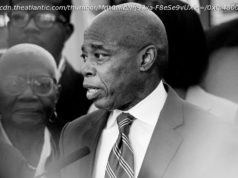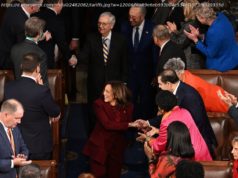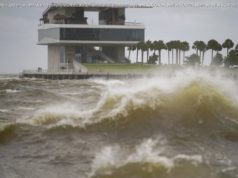Attorney General Jeff Sessions on Tuesday becomes the second of seven people who were in the Oval Office Feb. 14 to testify before the Senate Intelligence Committee.
Fired FBI director James Comey’s version of a critical Feb. 14 encounter with President Donald Trump gets it first test on Tuesday when Attorney General Jeff Sessions will testify before the Senate Intelligence Committee.
Sessions won’ t be able to tell senators what went on in the meeting – the president had ordered him out of the Oval Office, along with other officials, before speaking privately with Comey, according to Comey’s testimony.
But Sessions will be able to corroborate, or not, details of Comey’s version of events before and after the encounter, during which, Comey says, Trump all but directed him to back off an investigation into retired Army Lt. Gen. Michael Flynn, who until hours earlier had been Trump’s national security adviser.
Trump has denied Comey’s version of events. Barring the emergence of evidence such as a surreptitious recording of the conversation – Trump tweeted that Comey had better hope there are no tapes – deciding which of the two men’s accounts is factual may depend on which details most accurately reflect others’ recollections.
Of special interest will be Comey’s assertion that he told Sessions after the meeting that he never again wanted to be left alone with the president. Also certain to be of interest is Comey’s claim that Sessions “lingered” by Comey’s side when the president ordered the room cleared and what Sessions thought when the president then directed him to leave.
Tuesday’s testimony is likely also to touch on allegations that Sessions himself met more often than he has acknowledged with Russian Ambassador Sergey Kislyak. Sessions, an early Trump supporter, recused himself in March from oversight of the FBI’s probe into possible cooperation between the Trump campaign and the Russians when his meetings with Kislyak became known.
Reports from the White House indicate that recusal has been a sore spot between President Donald Trump and Sessions. Recent news reports have said Sessions offered to resign just weeks ago, saying he needed to be given “the freedom” to do his job.
The hearing comes less than a week after Comey’s explosive testimony.
The Feb. 14 meeting is critical to allegations from Trump’s detractors that the president obstructed justice when he told Comey, according to Comey’s version, “I hope you can see your way clear to letting this go, to letting Flynn go. He is a good guy. I hope you can let this go.”
Trump supporters have insisted that the president did nothing wrong, since there is nothing wrong with expressing “hope.” During his own testimony last week, Comey said that he understood Trump’s request “to be a directive.”
“I don’ t think it’s for me to say whether the conversation I had with the president was an effort to obstruct, ” Comey testified. “I took it as a very disturbing thing, very concerning.”
Sessions is the first of six high-level officials Comey said were asked to leave the room. Sessions is especially important to the case because as the attorney general, he was Comey’s boss, and because Comey testified “the attorney general lingered by my chair, but the president thanked him and said he wanted to speak only with me.”
Comey also testified that later, he implored “the attorney general to prevent any future direct communication between the president and me. I told the AG that what had just happened – him being asked to leave while the FBI director, who reports to the AG, remained behind – was inappropriate and should never happen. He did not reply.”
Members of both the Senate and House intelligence committees have insisted since that hearing that it is important they verify Comey’s testimony.
Sessions’ testimony is scheduled to begin at 2: 30 p.m. Tuesday. Typically, Senate Intelligence hearings on this topic have lasted about three hours. The announcement of his testimony was made without comment from committee officials, who decline to say whether Sessions would be sworn to tell the truth.
A third participant in that meeting, White House senior adviser and Trump’s son-in-law Jared Kushner volunteered in March to testify before the intelligence committee. That offer appears to stand, though the timing remains “to be determined.” In March, the committee announcement on the offer noted it would take place “after the committee determines that it has received any documents or information necessary to ensure that the meeting is productive for all sides.”
According to Comey’s testimony: “The last person to leave was Jared Kushner, who also stood by my chair and exchanged pleasantries with me. The president then excused him, saying he wanted to speak with me.”
According to Comey’s testimony, the others in the room, all of whom were asked to leave before the Flynn conversation, included Vice President Mike Pence; Gina Haspel, the deputy director of the CIA; Nicholas J. Rasmussen, the director of the National Counterterrorism Center, and retired Marine Gen. John F. Kelly, now the secretary of Homeland Security.
Comey described the Oval Office meeting, before his one-on-one with Trump, as “a scheduled counterterrorism briefing.”
Comey said Trump “sat behind the desk and a group of us sat in a semi-circle of about six chairs facing him on the other side of the desk.” He said there were “quite a few others in the room, sitting behind us on couches and chairs.”
After Trump had cleared the room, Comey said Chief of Staff “Reince Priebus leaned in through the door by the grandfather clock and I could see a group of people waiting behind him.”
He testified that he soon left through that same door, walking by a group of people that included Priebus and Pence.
Sign up today for a 30 day free trial of unlimited digital access.
Start
United States
USA — mix Jeff Sessions’ testimony is first chance to check Comey’s version of events






